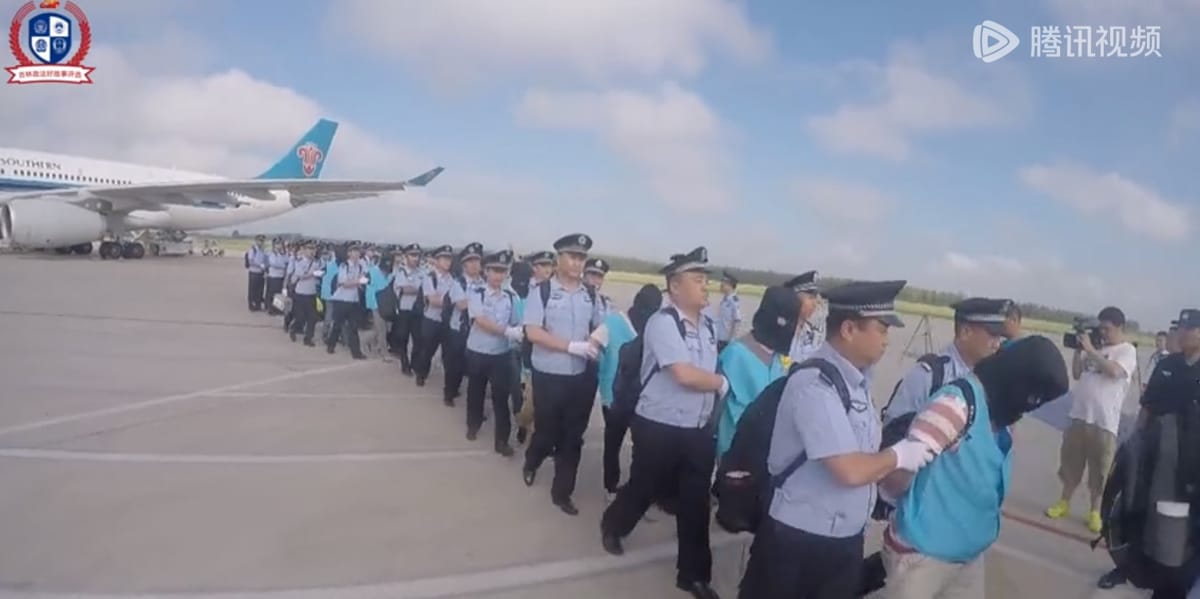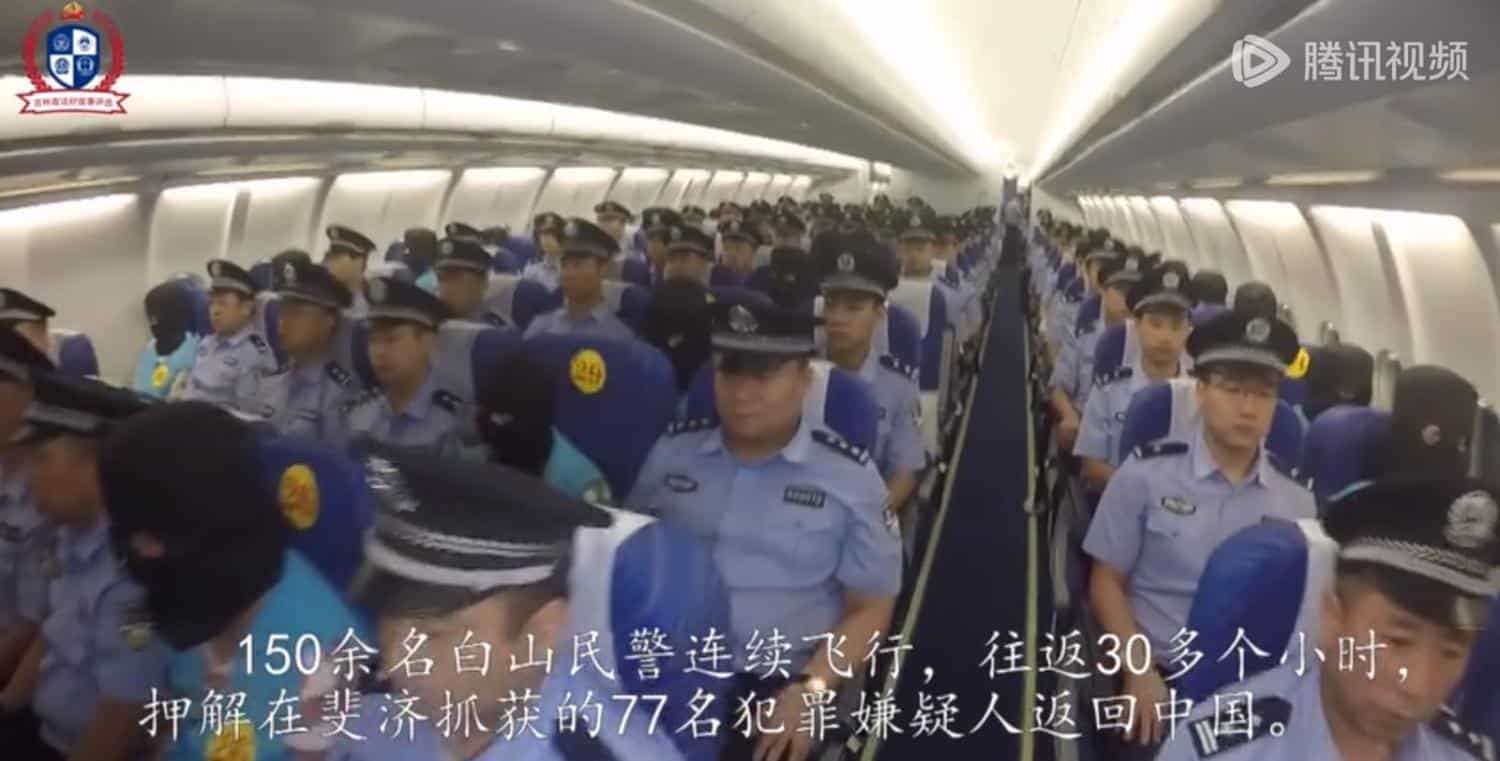Last night’s 60 Minutes broadcast in Australia featured extraordinary footage of 2017 Chinese police raids in Fiji, followed by the extraction of 77 People’s Republic of China citizens, hooded and marched onto a China Southern Airlines jet with a policeman on each arm. The suspects, accused of running online and phone scams targeting China, did not pass through the Fijian legal system, despite there being no extradition treaty in place.
Here we explain how the video was found and why it was made.
The record needs to be corrected – the video was found by Daria Impiombato, a researcher at the Australian Strategic Policy Institute, one of the authors of this piece. We knew there should be material online relating to the “9:22 Taskforce”, as it is referred to in Chinese, for the date when a victim of the scammers took her own life in Changbai, an autonomous county in Baishan City, near the North Korean border. We scoured the Chinese internet to find out what happened. While a lot has been censored, taken down, or geo-blocked, and many techniques that worked in the past are obsolete due to PRC government crackdowns, a lot remains accessible – especially on WeChat.
Little did we know that the local public security bureau had produced its own documentary about the entire operation, set to a stirring orchestral score.
It is easy to control access to official websites, such as government procurement sites, but more difficult to curb information on social media, where there are the competing needs of commerce, censorship and propaganda. A lot of information about policy implementation, party-state initiatives and, in this case, policing news are widely shared on WeChat. Law enforcement units and even the secret services have significantly upped their PR budgets. These posts communicate the effectiveness of Chinese Communist Party governance to the public, including to Chinese diasporas overseas, but they also become an opportunity for local officials to show off to their bosses at the central and provincial levels.
When looking into PRC police repatriation efforts in Fiji, we knew the operation – targeting online scammers, the most loathed criminals in China – would have been celebrated. Little did we know that the local public security bureau had produced its own documentary about the entire operation, set to a stirring orchestral score. While scrolling through media reports of the incident, the link to the video stood out as it was shared directly by the provincial public security department – an official, primary source. On top of giving away many of the officials responsible for the operation, notably Guo Shengkun, then minister for public security, it also shows the faces of those who have been arrested, both at home and abroad.

It is still difficult to archive videos, especially on WeChat, and worried the post would be taken down, we rushed to save it locally. Far from keeping it secret, I’ve given several talks over the last year where I’ve screened the video, including a public talk at the University of the South Pacific in Suva last July. It even featured on the nightly TV news.
While it’s compelling television, why was it made? We’d expected newspaper articles and TV channels carrying the speech made by Jilin province’s top cop, Hu Jiafu, who presided over the handing out of bouquets after the China Southern Airlines plane landed in Changchun. But why such over-the-top theatre, two police for each hooded suspect, set to music? You can watch the full video here, if it hasn’t been taken down.
Clues are in the video itself, filmed in October 2017, and Hu’s speech. In the speech at the airport, and in the video, the operation is referred to as part of an ongoing “image war”. The video is presented with a moral arc, the final WeChat message from Xu He, a mother said to have taken her own life after losing 1.16 million yuan ($250,000) in a fake internet lottery, and a further 142,000 yuan in a personal loan. Her death is also re-enacted. When suspects are rounded up across China, Fiji and Indonesia, the viewer is primed to take the side of the police.
The point of the video was spelled out by Hu Jiafu at Changchun Longjia Airport: “No matter who the criminal suspect is or where he goes, the public security organs will relentlessly hunt him down and bring him to justice so that he has nowhere to hide and nowhere to stay. He will be punished according to the law … The battle of encirclement and suppression … is an image battle to show the world the combat effectiveness of our province and even China’s public security.”
The audience for the message is not the world – who but for Nine reporter Nick McKenzie’s acumen in spotting a good story wouldn’t have heard of the 9:22 Taskforce – but rather the bosses of the Baishan City Public Security Bureau and the Chinese public. Like governments everywhere, when a problem is out of control, they put on a show – what author Iza Ding calls “performative governance”. Ding wrote about the struggles of China’s environmental protection officers, unable to protect the public from pollution, but under intense public scrutiny to show they are doing something.
China’s police are in the same boat with transnational online scams. These over-the-top show arrests will continue, from Myanmar to Indonesia to Kenya. The Ministry of Public Security’s own statistics from 2016 – the year the crime was committed – found that there were 312 “telecom network fraud dens” in 29 countries that “defraud the mainland every day”. More videos will be made.
This article was published by the Lowy Institute‘s theinterpreter.
Graeme Smith is a senior fellow at ANU’s Department of Pacific Affairs.
Daria Impiombato is an analyst at the Australian Strategic Policy Institute focusing on China, technology and human rights.
The opinions expressed in this article are those of the author and do not necessarily reflect the opinions of this publication.
